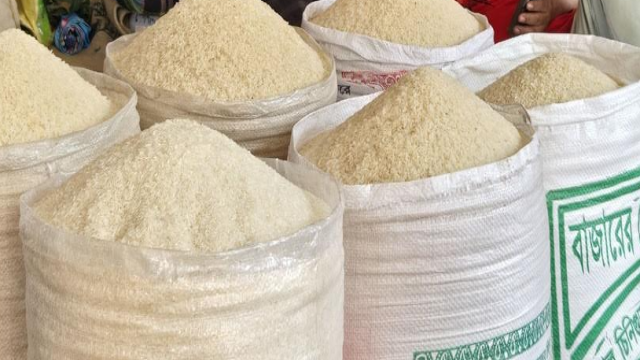Rajshahi, June 25 (V7N)– Despite a successful Boro season with adequate rice supply and a better yield than previous years in the Rajshahi region, rice prices have unexpectedly surged since Eid-ul-Azha. Both retail and wholesale traders are pointing fingers at mill owners, accusing them of creating an "artificial shortage" in the market through syndication.
According to observations in Rajshahi city's wholesale and retail markets on Sunday, June 22, the price of Miniket rice has jumped from Tk 75 to Tk 80 per kilogram, a Tk 5 increase. Medium-quality '28 rice' has also seen a rise, from Tk 62 to Tk 64 per kilogram.
Other varieties have followed suit, with prices increasing by Tk 5-6 per kilogram across the board. Jirashail, which was Tk 64-66 before Eid, is now Tk 70-72; Katari has gone from Tk 66-68 to Tk 75-80; BR R-28 from Tk 59-60 to Tk 65-66; and Swarna-5 from Tk 53-54 to Tk 58-60.
Farmer Ziarul Islam from Godagari upazila noted that while Boro paddy is selling for Tk 1,350-1,400 per maund (approximately 25 kg of rice per maund, making the paddy cost equivalent to Tk 55-56 per kg of rice), companies are selling Miniket rice, often processed from this paddy, at a much higher Tk 75-80 per kg.
Wholesale traders in Kumarpara confirmed the price hikes, attributing them to mill owners. Sohel Rana, a warehouse owner, stated they are forced to buy and sell at higher prices because mill owners have increased their rates. Retailer Saikat Ali added that after an initial drop in prices at the start of the Boro season, prices began to climb again last Saturday, following Eid.
Shop owner Abdul Awal in Saheb Bazar echoed these sentiments, expressing surprise at the price increase immediately after the paddy harvest. He accused mill owners of deliberate syndication, citing Diamond Miniket selling at Tk 82 per kg and other Miniket varieties also at elevated prices.
A rice mill owner, who wished to remain anonymous, blamed the lack of an elected government and its ineffective stockpiling policy for the situation. He alleged that corporate traders bought and hoarded over half of the paddy entering markets at the beginning of the Boro season. This has left ordinary millers with little paddy, forcing them to buy at abnormally high prices, which in turn increases their production costs and is reflected in the wholesale price increase of Tk 2-6 per kg over the past week.
Rafiqul Islam, president of the Rajshahi Rice Mill Owners Association, criticized the interim government for not taking "visible steps to control the rice market." He claimed that "big companies are manipulating them" and that "rice prices are increasing rapidly due to lack of discipline." He called for strict action against those responsible for the manipulation to bring stability back to the market.
This situation in Rajshahi mirrors concerns raised nationwide. Reports from Kishoreganj also indicate a Tk 4-6 per kg rice price hike since Eid-ul-Azha, despite a record Boro harvest. Traders and agricultural experts have implicated corporate companies and rice mills, suggesting they stockpiled paddy bought at low prices before Eid and are now driving up prices. The Consumers Association of Bangladesh (CAB) has also highlighted that farmers often sell at low prices during harvest, only for prices to rise once the grain is out of their hands, disadvantaging both farmers and consumers. The financial press has also warned of potential instability in the rice market once the post-harvest period ends, pointing to intensified competition among millers and affiliated traders.
END/RAR/RH/































Comment: